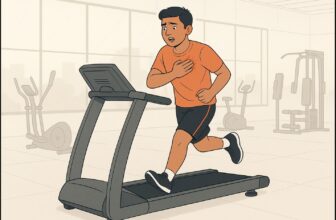You might notice it when you wake up, after sitting too long, or while working on your phone or laptop , a tingling or pins-and-needles feeling in your hands or feet. While it’s often brushed off, this sensation can signal a deeper issue.
In India, causes range from vitamin deficiencies and diabetes to posture habits and nerve pressure. Fortunately, many of these can be managed or reversed if you act early.
Here are 13 practical ways to treat tingling in hands and feet, based on common causes and care options available across India.
1. Check for Vitamin Deficiencies That Affect Nerve Health
Low vitamin B12 is one of the leading causes of tingling in India, especially among vegetarians. B12 supports nerve function, and a deficiency may show up as numbness or a burning sensation in hands and feet.
- Get a blood test for B12, D3, and iron
- Take oral supplements or B12 injections if advised
- Add eggs, dairy, fortified cereals, or supplements to your diet
2. Balance Your Blood Sugar, Even if You’re Not Diabetic
Many cases of tingling are linked to high blood sugar levels. If you have diabetes or are at risk, elevated glucose can damage the nerves over time , a condition called peripheral neuropathy.
- Monitor fasting glucose and HbA1c regularly
- Reduce sugar, fried snacks, and processed foods
- Follow a fiber-rich meal plan and stay active
3. Adjust the Way You Sit and Sleep
Sitting cross-legged for hours, leaning on elbows, or sleeping with wrists bent can compress nerves and reduce blood flow , leading to tingling.
- Switch to chairs with proper back and arm support
- Keep feet flat and avoid pressure on legs
- Use a wrist cushion or neutral hand position during sleep
4. Ease Repetitive Stress on Hands and Wrists
Long periods of typing, scrolling, or gripping a steering wheel can irritate nerves in the wrist. Over time, this may lead to carpal tunnel symptoms.
- Take short breaks every 30-45 minutes
- Use ergonomic keyboards or wrist rests
- Try wrist braces if tingling increases with movement
5. Stretch and Massage Gently to Improve Circulation
Poor circulation and tight muscles can reduce oxygen supply to nerves. Stretching and massage can restore blood flow and relax nerve pathways.
- Massage hands and feet with warm oil for 10-15 minutes
- Stretch wrists, calves, and hamstrings daily
- Avoid deep tissue massage if pain or swelling is present
6. Drink More Water, Especially in Hot Weather
Nerves require proper hydration to function well. In India’s climate, dehydration is a common trigger for muscle cramps and nerve irritation.
- Aim for 2.5-3 liters of water a day
- Add a pinch of salt or lemon for electrolyte balance
- Avoid excess caffeine, which can worsen dryness
7. Include Foods That Strengthen Nerve Tissue
Nutrient gaps can slow nerve repair. Eating the right foods ensures you support nerve recovery and reduce inflammation.
- Add leafy greens, soaked almonds, sunflower seeds, and coconut
- Include whole grains like millets and brown rice
- Use healthy fats like ghee or cold-pressed oils in small amounts
8. Apply Warm Compresses to Relax Nerves
If tingling comes with stiffness or coldness in your limbs, heat therapy may provide relief. It improves circulation and helps relax tight areas.
- Soak hands or feet in warm water for 10-15 minutes
- Use a hot water bag wrapped in a cloth
- Don’t use heat if there’s swelling or redness
9. Try Physiotherapy if Movement Is Limited
If tingling affects your ability to grip, balance, or walk, consider seeing a physiotherapist. They can guide exercises to strengthen weak muscles and relieve pressure on nerves.
- Seek clinics offering nerve stimulation therapy
- Focus on posture correction and mobility
- Continue exercises at home once trained
10. Rule Out Nerve Compression in the Neck or Lower Back
If tingling follows a pattern , like from neck to arm, or back to foot , you may be dealing with a pinched nerve. This can come from a disc pressing on a nerve root.
- Ask your doctor about X-rays or MRI if tingling is one-sided
- Avoid self-adjusting your neck or back
- Use lumbar or cervical supports while sitting
11. Avoid Long-Term Use of Over-the-Counter Painkillers
While some painkillers can reduce temporary discomfort, they don’t fix the source. Prolonged use can hide worsening symptoms and cause other side effects.
- Use medication only under medical supervision
- Don’t rely on sprays, balms, or patches for long-term care
- Track when and where the tingling occurs instead
12. Explore Ayurvedic or Herbal Support With Guidance
India has traditional approaches for nerve support , but these should be used with care and professional advice.
- Use oils like Mahanarayan or Dhanwantharam for external massage
- Herbs like Ashwagandha and Brahmi may support nerve repair
- Always consult a certified practitioner to avoid wrong combinations
13. Visit a Neurologist if Tingling Lasts More Than Two Weeks
If tingling doesn’t improve with rest or basic care, or if it spreads, you may need tests to identify deeper nerve issues. Don’t ignore symptoms that stay constant or interfere with sleep or movement.
- Request a nerve conduction study (NCV/EMG) if advised
- Share your medication history and lifestyle during your visit
- Early detection helps prevent long-term nerve loss
When It’s Not Just Tingling
While occasional pins-and-needles aren’t unusual, pay attention if you experience:
- Tingling with muscle weakness
- Loss of grip or balance
- Numbness on one side of the body
- Changes in vision, speech, or coordination
These signs require immediate evaluation.
Summary – Simple Adjustments That Often Work
Tingling is your body’s way of flagging something that needs attention, be it a missing nutrient, a pressure point, or an early sign of a larger issue. In most cases, simple changes to how you sit, eat, move, and rest can make a big difference.
Start with what you can control, and don’t hesitate to seek guidance when home remedies aren’t enough. A timely response today can prevent long-term nerve damage.





